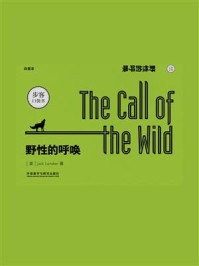




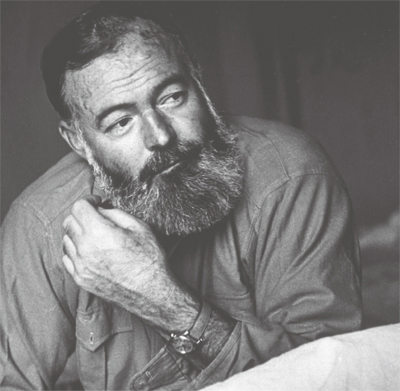

音频
在文学世界里,他以“文坛硬汉”著称,一生著述颇丰,获奖无数;在现实生活中,他活得真实而纯粹,过着自己想过的生活,从不放过任何机会,从未泯灭过对生命的热情。他是文学界的大师级人物——欧内斯特·海明威。在本文中,我们暂且将他的文学成就放于一边,而是走进他的真实生活,去了解一个不一样的海明威,去体会他充满惊险与刺激的多面人生。
Fifty years after his death, Ernest Hemingway remains a
commanding
 presence in the literary world. His works annually sell well into the seven figures, and several of his astounding 27 books and 50+ short stories are considered to be masterpieces of American literature. Even the finest works of fiction
pale in comparison
presence in the literary world. His works annually sell well into the seven figures, and several of his astounding 27 books and 50+ short stories are considered to be masterpieces of American literature. Even the finest works of fiction
pale in comparison
 , however, to Papa Hemingway's real life. His
exploits
, however, to Papa Hemingway's real life. His
exploits
 are legendary: winner of both the Pulitzer and Nobel Prizes, world class sports fisherman,
big game
are legendary: winner of both the Pulitzer and Nobel Prizes, world class sports fisherman,
big game
 hunter, boxer, war correspondent … the list goes on. Leaving the criticism of his literature for the pros, let's instead take a look at the amazing life of the man himself. His life was filled with the grand adventures that fill the dreams of many young boys and grown men alike.
hunter, boxer, war correspondent … the list goes on. Leaving the criticism of his literature for the pros, let's instead take a look at the amazing life of the man himself. His life was filled with the grand adventures that fill the dreams of many young boys and grown men alike.
As an accomplished outdoorsman, Hemingway was equally
at home
 both
stalking
both
stalking
 a lion through Africa's long grass and cruising the
Gulf Stream
a lion through Africa's long grass and cruising the
Gulf Stream
 in search of marlin. Hemingway had learned how to handle a gun at a young age and was an accomplished hunter. His interest in the sport varied between pheasant and duck shooting out West to big game
safaris
in search of marlin. Hemingway had learned how to handle a gun at a young age and was an accomplished hunter. His interest in the sport varied between pheasant and duck shooting out West to big game
safaris
 in East Africa. Hemingway's love for safari was very clear in his uncontainable excitement in planning his second major hunt in 1954: "Going back to Africa after all this time, there's the excitement of a first adventure. I love Africa and I feel it's another home, and any time a man can feel that, not counting where he's born, it is where he's meant to go."
in East Africa. Hemingway's love for safari was very clear in his uncontainable excitement in planning his second major hunt in 1954: "Going back to Africa after all this time, there's the excitement of a first adventure. I love Africa and I feel it's another home, and any time a man can feel that, not counting where he's born, it is where he's meant to go."
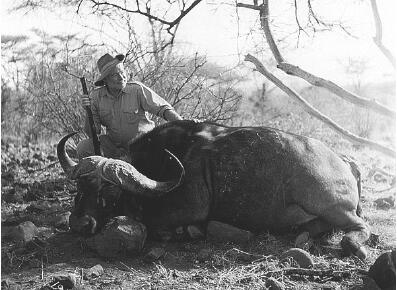
海明威在狩猎
During this second safari Hemingway became quite the professional hunter. The local
game warden
 even left him temporarily in charge of the district he was
quartered
even left him temporarily in charge of the district he was
quartered
 in. Hemingway loved the post and spent most of his days sorting out problem lions and elephants at the request of the local farmers.
in. Hemingway loved the post and spent most of his days sorting out problem lions and elephants at the request of the local farmers.
Yet while Hemingway loved hunting, it was when he had a rod in his hand that he was truly successful. It was from the deck of the
Pilar
 that Hemingway famously landed the largest marlin caught to date in 1935, weighing an astonishing 1,175 lbs. Truly, his greatest exploit by his own reckoning may very well not have been his literary achievements, but his success with rod and reel.
that Hemingway famously landed the largest marlin caught to date in 1935, weighing an astonishing 1,175 lbs. Truly, his greatest exploit by his own reckoning may very well not have been his literary achievements, but his success with rod and reel.
Hemingway had practiced the
sweet science
 since childhood and at one point was a successful amateur boxer. Following one of his victories in a fishing tournament in
Bimini
since childhood and at one point was a successful amateur boxer. Following one of his victories in a fishing tournament in
Bimini
 , the locals who had participated became angered at his ability to better them in the fish waters they had fished their entire lives. Seeing an opportunity to combine his passions, he offered the locals a chance to win back their lost money. The terms were simple: go
toe to toe
, the locals who had participated became angered at his ability to better them in the fish waters they had fished their entire lives. Seeing an opportunity to combine his passions, he offered the locals a chance to win back their lost money. The terms were simple: go
toe to toe
 with old Papa in the
ring
with old Papa in the
ring
 for three rounds and win, and the money would be theirs. The first challenger, a man who locals claimed could "carry a piano on his head", made it only a minute and a half before the 35 year old Hemingway put him on the deck. The next three challengers suffered a similar fate, and Ernest went home with his prize money.
for three rounds and win, and the money would be theirs. The first challenger, a man who locals claimed could "carry a piano on his head", made it only a minute and a half before the 35 year old Hemingway put him on the deck. The next three challengers suffered a similar fate, and Ernest went home with his prize money.
Hemingway's love for boxing was unmatched by his other passions, and he even had a boxing ring built in the backyard of his
Key West
 home. He often dedicated his time not spent writing in Key West to boxing.
home. He often dedicated his time not spent writing in Key West to boxing.
Hemingway's love of the sport carried over into the literary world as well. Several of his works reflect his love for the sport, including short stories Fifty Grand and The Battler, and the novel The Sun Also Rises.
As a young man, Hemingway served with the Red Cross on the Italian Front in World War I. Originally, he had sought to enlist in the Army, but poor eyesight barred his admittance, leading him to take a position with the Red Cross as an ambulance driver instead. Not long after arriving at the Italian Front Hemingway was seriously wounded. While delivering chocolates and cigarettes to soldiers on the line, he was hit by
trench mortar
 fire, leaving over two hundred
shrapnel
fire, leaving over two hundred
shrapnel
 fragments in his leg and nearly destroying his knee. Despite this gruesome injury, Hemingway managed to drag another injured soldier to safety, having stuffed the cigarettes he was carrying into his own wounds to temporarily stop the bleeding. Hemingway was to receive the Silver Medal of Military
Valor
fragments in his leg and nearly destroying his knee. Despite this gruesome injury, Hemingway managed to drag another injured soldier to safety, having stuffed the cigarettes he was carrying into his own wounds to temporarily stop the bleeding. Hemingway was to receive the Silver Medal of Military
Valor
 from the Italian government for his courageous actions that day.
from the Italian government for his courageous actions that day.
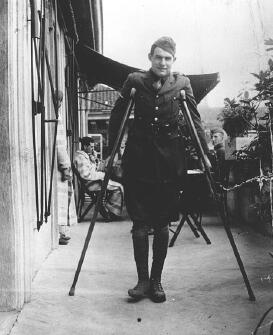
海明威受伤复原中
Much later in life, Hemingway left again for Europe to see the action of World War II as a war correspondent. No stranger to action, Hemingway joined the Royal Air Force on bombing raids and followed
infantry
 divisions around Europe wherever the fighting was heaviest. He witnessed the
D-Day
divisions around Europe wherever the fighting was heaviest. He witnessed the
D-Day
 invasion from a landing craft just offshore and recorded many of the horrors of the war. Hemingway went on to take a much more active role in the combat he was there to document, often assuming the role of soldier himself in direct violation of the Geneva Conventions’ guidelines for war correspondents. In the chaos of war, Hemingway allegedly went on to form his own unit, which inexplicably had twice the firepower and alcohol rations of all other units, no doubt Papa's doing. An investigation into his actions during the war by the Army later charged him with several violations of his non-combatant status, including actions such as stripping off his non-combatant
insignia
invasion from a landing craft just offshore and recorded many of the horrors of the war. Hemingway went on to take a much more active role in the combat he was there to document, often assuming the role of soldier himself in direct violation of the Geneva Conventions’ guidelines for war correspondents. In the chaos of war, Hemingway allegedly went on to form his own unit, which inexplicably had twice the firepower and alcohol rations of all other units, no doubt Papa's doing. An investigation into his actions during the war by the Army later charged him with several violations of his non-combatant status, including actions such as stripping off his non-combatant
insignia
 and posing as a colonel in order to lead a French resistance group into battle.
and posing as a colonel in order to lead a French resistance group into battle.
Several high ranking friends testified on his behalf, and at the end of the investigation he was not only cleared of all charges, but was awarded the Bronze Star for Bravery as a war correspondent. Colonel Lanham, a close friend, noted: "He is without question one of the most courageous men I have ever known. Fear was a stranger to him."
Perhaps most unbelievable of all Hemingway's exploits was the sheer number of potentially fatal diseases and accidents he survived. Aside from the
remnants
 of fragment in his leg left over from the World War I mortar hit, he also bore a bullet wound in his leg. This was the result of a self inflicted gunshot, an accident that occurred while trying to finish off a still thrashing shark he had dragged aboard while shark hunting. Hemingway's more severe injuries and ailments came later in life. In his later years he survived pneumonia, skin cancer, hepatitis, diabetes, high blood pressure, and several major injuries.
of fragment in his leg left over from the World War I mortar hit, he also bore a bullet wound in his leg. This was the result of a self inflicted gunshot, an accident that occurred while trying to finish off a still thrashing shark he had dragged aboard while shark hunting. Hemingway's more severe injuries and ailments came later in life. In his later years he survived pneumonia, skin cancer, hepatitis, diabetes, high blood pressure, and several major injuries.
During his last safari in East Africa, he survived two plane crashes. News of the first crash, deep in the jungles of Uganda, set off reports of his death back home,
spawning
 numerous obituaries which Hemingway would later read daily over his morning coffee with amusement. The second crash, following just several days after the first, was much more severe, and Hemingway was severely injured as a result. He suffered from a laundry list of injuries, including first degree burns, internal bleeding,
ruptured
numerous obituaries which Hemingway would later read daily over his morning coffee with amusement. The second crash, following just several days after the first, was much more severe, and Hemingway was severely injured as a result. He suffered from a laundry list of injuries, including first degree burns, internal bleeding,
ruptured
 kidney, ruptured
spleen
kidney, ruptured
spleen
 , ruptured liver, etc. Quite the ordeal, yet Hemingway managed a smile for the reporters waiting at his
evacuation
, ruptured liver, etc. Quite the ordeal, yet Hemingway managed a smile for the reporters waiting at his
evacuation
 point, saying to them "my luck". Not a month later Hemingway was back in action, this time receiving second degree burns on his left hand and face while fighting a wildfire.
point, saying to them "my luck". Not a month later Hemingway was back in action, this time receiving second degree burns on his left hand and face while fighting a wildfire.
He survived all this and lived to tell the tale.
Hemingway's life experiences provided the source material for his literary works, and much of his life can be seen reflected in his fiction. The male protagonists in so many of his stories share both his
machismo
 and his hidden pains, yet always exhibited grace under pressure. As he himself said: "In going where you have to go, and doing what you have to do, and seeing what you have to see, you dull and blunt the instrument you write with. But I would rather have it bent and dulled and know I had to put it on the
grindstone
and his hidden pains, yet always exhibited grace under pressure. As he himself said: "In going where you have to go, and doing what you have to do, and seeing what you have to see, you dull and blunt the instrument you write with. But I would rather have it bent and dulled and know I had to put it on the
grindstone
 again and hammer it into shape and put a whetstone to it, and know that I had something to write about, than to have it bright and shining and nothing to say."
again and hammer it into shape and put a whetstone to it, and know that I had something to write about, than to have it bright and shining and nothing to say."
Critics during and after his lifetime tried to paint Hemingway as overly macho, claiming that his public persona was merely an act. Through reading his works and the biographies written about him by close friends, it becomes clear that Ernest Hemingway was not acting. He was, in fact, one of the most genuine men who ever lived. He lived life as he wished, never missing opportunities and never forsaking his passions. Perhaps he is best summed up by actress Marlene Dietrich, a close friend: "I suppose the most remarkable thing about Ernest is that he has found time to do the things most men only dream about. He has had the courage, the initiative, the time, the enjoyment to travel, to digest it all, to write, to create it, in a sense. There is in him a sort of quiet rotation of seasons, with each of them passing overland and then going underground and re-emerging in a kind of rhythm, refreshed and full of renewed vigor."
在去世50年之后,欧内斯特·海明威在文学世界中依然保持着重要的地位(编注:英文原文刊发于2009年8月)。他的著作每年的销售量都在七位数以上。他一生著有27部著作和50余篇短篇小说,部部作品无不令人称奇,其中有些著作和篇目被视为美国文学的典范之作。然而,若和老爹海明威的现实生活相比,哪怕是他最优秀的小说也会相形失色。海明威的一生有着传奇般的成就:普利策文学奖和诺贝尔文学奖的双料得主、世界一流的垂钓运动爱好者、大型猎物狩猎者、拳击手、战地记者……他的头衔不胜枚举。关于他作品的文学批评就留给专业人士去做吧,现在我们来探究一下他本人充满传奇色彩的人生。他的一生充满惊险与刺激,是许多男人——无论是少年还是成年人——梦寐以求的人生。
海明威擅长户外运动。无论是在非洲的深草丛中围捕狮子,还是游弋在墨西哥暖流上搜捕枪鱼,他都应对自如、游刃有余。海明威年纪轻轻就学会了用枪,是个技能娴熟的猎人。他的狩猎兴趣相当广泛,近到去美国西部猎取野鸡和野鸭,远到去东非进行大型狩猎旅行。1954年,在计划进行第二次大规模狩猎活动时,他掩饰不住兴奋的心情,写道:“回到阔别已久的非洲,激动的心情不亚于第一次来这里冒险时的感受。我爱非洲,我觉得这里就是我的另一个家。一个男人,无论生于何地,一旦有这种感觉,那就说明这是他注定要去的地方。”海明威对狩猎旅行的热爱在这样的兴奋表述中坦露无遗。
在第二次狩猎旅行中,海明威成了一名相当专业的猎手。当地的狩猎法执法官甚至将海明威所居住的猎区临时交给他来管理。海明威非常喜欢这个工作,在当地农民的请求下,他把大部分时间都花在了驱赶祸害庄稼的狮子和大象上。
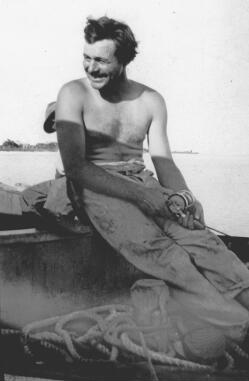
海明威在基维斯特钓鱼
然而,尽管海明威酷爱打猎,他真正的成功却是在手握钓竿的时候。他曾有过一次远近闻名的捕鱼经历。1935年,他在“比拉号”渔船上成功地捕获了一条重达1175磅的枪鱼,这条令人叹为观止的大鱼是截至当时被捕获的最大的一条枪鱼。的确,在他个人看来,他一生最辉煌的事迹很可能不是他在文学领域的成就,而是他在垂钓方面的成功。
海明威小时候就开始练习拳击这门“甜蜜的科学”,一度是一名非常成功的业余拳击手。在比米尼群岛举行的一次钓鱼锦标赛上,海明威屡屡得胜。在其中一次获胜之后,当地的一些参赛者开始愤愤不平起来,他们不服气:在他们终日捕鱼的这片水域,海明威竟然有能力超过他们。海明威把众人的怒气看成是一次机会,他想趁此把自己的不同爱好结合起来,于是便提出可以给那些当地人一个机会,让他们赢回奖金。条件非常简单:在拳击场上和老爹面对面打三个回合,如果他们赢了,奖金就是他们的。第一个挑战者据当地人说“能够用头顶起一架钢琴”,但只坚持了一分半钟就被35岁的海明威击倒在拳击台上了。另外三名挑战者的命运也都大同小异。于是,海明威带着他的奖金得意而归。
拳击是海明威的最爱,其他爱好皆不能与之相比。在他位于基维斯特的家的后院里,他甚至还搭建了一个拳击场。在基维斯特的家里,每当不写作时,他的时间往往都花在拳击上。
海明威也将他对拳击运动的喜爱带到了文学世界。他的好几部作品都反映了他对拳击的热爱,包括短篇小说《五万美金》和《拳击手》以及长篇小说《太阳照常升起》。
第一次世界大战期间,海明威参加了意大利前线的红十字会,当时他还很年轻。其实,他原本是极力要参军的,但由于视力不好未被录取。于是,他只好加入红十字会,成了一名救护车司机。到达意大利前线不久,海明威就受了重伤。在给前线士兵运送巧克力和香烟时,他被迫击炮炸伤,腿上留下了两百多片炮弹碎片,整个膝盖几乎都废掉了。虽然身受重伤,但他却成功地将另一名受伤的战士拖到了安全的地方,自己则把运送的香烟塞在伤口上以暂时止血。后来,意大利政府为他颁发了军队英勇银质勋章,以褒奖他那天的英勇行为。
中年以后,海明威又一次进入欧洲,这一次他作为战地记者来亲眼目睹二战战事。海明威对战事并不陌生,他加入了英国皇家空军的一系列空袭行动,又追随步兵师跑遍了整个欧洲。哪里战事最激烈,哪里就有他的身影。在离海岸不远的一艘登陆艇上,他亲眼目睹了盟军在诺曼底登陆当日的登陆过程,记录了战争中的许多恐怖场景。接下来,海明威在他采访和纪录的一些战斗中扮演了更为积极主动的角色,常常担负起一名士兵的职责。而这显然直接违反了《日内瓦公约》中对战地记者行动的有关规定。据说,在当时战争的混乱局面中,海明威组织了一支自己的作战队伍。而且,这支队伍居然不知从哪里搞到了比其他所有作战单位多一倍的火力和酒类配额。毫无疑问,这肯定是老爹的“功劳”。后来,军方组织了一个调查组,专门调查他在战争期间的所作所为,指控他多次违背了自己作为非战斗人员应遵守的规则,包括撕掉他的非战斗人员徽章,以及假冒上校领导法国的一支抵抗组织进行战斗。
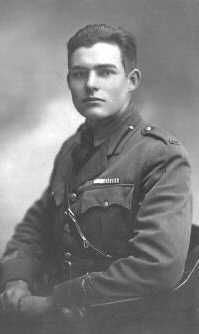
海明威在意大利米兰
他的几个高级军官朋友在调查中为他做了有利证词。在调查结束时,军方不但撤消了对他的所有指控,还向他颁发了战地记者的英勇青铜星章。他的一位好朋友兰海姆上校说:“毫无疑问,他是我所认识的最勇敢的人之一。他从不知恐惧为何物。”
在海明威的所有辉煌成就中,最令人难以置信的是他多次大难不死,一次又一次从致命的疾病和事故中逃生。除了第一次世界大战中迫击炮弹在他腿上留下的残余弹片外,他腿上还受过一次枪伤。这次枪伤是他自己用枪走火造成的,事故发生在他猎捕鲨鱼的时候。当时,他已将鲨鱼拖到甲板上,但鲨鱼还是不停地挣扎,他试图用手枪干掉那头鲨鱼,却失手伤了自己。在人生的后半段,海明威又经历了各种各样更为严重的外伤和疾病。晚年时,他先后得过肺炎、皮肤癌、肝炎、糖尿病、高血压,并多次遭遇严重外伤,但他一次次都死里逃生。
在他最后一次前往东非的狩猎之行中,他遭遇了两次飞机失事,但都幸运脱险。第一次坠机事故发生在乌干达丛林深处,消息传到美国,人们纷纷报道他已死亡的消息,许多报刊都登了讣告。这些讣告后来成了海明威每天早上一边喝咖啡、一边读着玩儿的消遣读物。就在第一次坠机事故发生仅仅几天后,又发生了第二次坠机事故。这次事故要严重得多,海明威因此身受重伤。他受的伤简直可以开一个长长的清单,包括一度烧伤、内出血、肾脏破裂、脾脏破裂、肝脏破裂等等。虽然身受疼痛的折磨,海明威还是对在救援现场等待的记者们露出了一个微笑,对他们说:“我真幸运。”之后,不出一个月,海明威就又开始狩猎活动了。这一次,他遇到一场野火,在灭火过程中,他的左手和脸部被烧成二度烧伤。
这一切事故和伤痛都没能要了海明威的命。他活了下来,亲口向世人讲述他的故事。
海明威一生的经历为他的文学创作提供了丰富的素材,他的许多人生经历都在小说中得到了反映。在他的许多短篇小说中,男主人公既有他的男子气概,也有他的内心痛苦,然而在压力之下却又总能从容不迫,坦然承受。正如他自己所言:“人都有自己的必去之所、必做之事和必见之物。在这一过程中,你用以写作的工具也许会变钝,不再锋芒毕露。但是,我情愿它折弯、变钝,心里明白我必须将它再次放在磨石上,打造成型,用砥石磨光,但知道自己仍有东西可写,也不愿意把它保养得光鲜照人,而我却无话可说。”
在海明威的生前身后,总有一些评论家试图将他描绘成一个过分追求男子气概的人,声称其公共形象只是在装模作样。但在读了他的作品和其好友写的有关他的传记之后,我们能清晰地看出,欧内斯特·海明威并不是在演戏。事实上,他是一个活得最真实的人。他过的是自己想过的生活,从不放过任何机会,也从未舍弃过自己热爱的东西。也许,他的好朋友、演员马琳·迪特里希的话是对他一生最好的总结:“我认为欧内斯特最突出的特点在于,大多数男人只能在梦中想一想的事,他却花时间做到了。从某种意义上来说,他一直都有勇气、进取心、时间和情趣去旅游、消化、写作和创造。在他的内心深处,季节在悄悄地流转,每一个季节都先降临大地,然后转入地下,然后重现,周而复始,循环往复,每次都生机勃发,充满新生的能量。”


